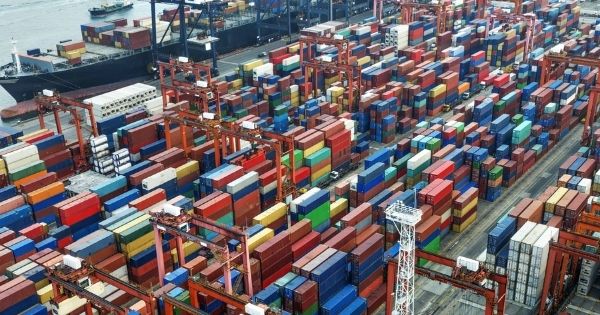More than 1.9 million TEU (20-foot container type) of cargo are at sea and destined for ports that are already congested around the world, according to logistics information platform Project44.

Port congestion in New York, USA (Photo: Morethanshipping)
After the Ever Given ran aground on the Suez Canal in late March, as many as 400 ships, many of them container ships, running north and south were delayed due to congestion and are currently reaching their entry destinations. at the same time, at ports that were already congested.
“With congested vessels finding their way to ports following the Suez Canal incident, cumulative delays for cargo ships of 1,017 days, run the risk of flooding into ports with congested cargo. For weeks to come, Project44 is warning shippers that their headache isn't over yet with a capacity of more than 1.9 million TEUs.
According to Project44, Singapore has more than 370,000 TEUs on its way, with more than 83 ships corresponding to 299,310 TEUs already at the port or anchored waiting for cargo handling as of April 12.
A similar story can be seen in Rotterdam, where 15 ships with a total capacity of 196,600 TEU "will arrive next week, lined up after 85 ships already at the port or waiting to enter the port."
Project44 says other major global ports are preparing for an inflow of cargo including New York, with 76,500 TEUs coming to or from the Suez Canal incident; Port Kelang, at 103,900TEU; and Jebel Ali, at 75,879TEU.
“The flow of ships will also exacerbate delays in ports that can be measured by days. With delays on major trade routes such as Shanghai - Rotterdam approaching the one-week mark - a worrying increase compared to 2020, when the average delay for ports on the same service is 2.79 days, ”the company said.
Traffic through the Suez Canal accounts for about 12% of global trade and the potential for disruptions is enormous at ports as far apart as New York and Shanghai.
Delays in transit routes that are expected to be significantly affected are Shanghai - New York, where the average March delay time is 8.05 days (up from 1.09 days on March 2020); Shenzhen - Hamburg, where the average delay last month was 9.23 days (up from 3.52 days in March 2020); and Shenzen - Newark-Elisabeth, where average latency was 12.92 in March (up from 0.29 days in March 2020).
“The Suez Canal Incident delivers the message that shippers must be prepared for unexpected disruptions in their supply chain. Shippers need capabilities such as real-time awareness and enhanced disruption alert as well as the ability to devise strategies to prevent them and make them easier to manage ”, Josh Brazil, Vice President marketing, said Project44.